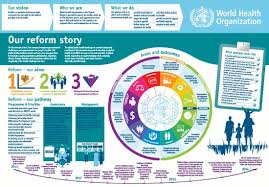A Unique Opportunity for Redesigning Global Public Authority in Global Health
When WHO Member States fail to reach consensus, the Director-General Margaret Chan has a little trick for encouraging them to break the negotiation deadlocks: she starts singing (as reported here or here … you can even listen here). However, it is unlikely that such a trick would suffice to overcome the most challenging undertaking Chan has to face during her second term: the WHO Reform process.
The first concrete steps in this process were taken in 2013 with the approbation by the WHA of a “trio of structural reforms”: the General Program of Work (2014-2019) (available here), and two related financial steps. While these steps are currently debated in WHO regions, this post takes a closer look on why the reform is needed and illustrates the difficulties of repositioning WHO as a leading authority in the multicentric lanscape of global health.
A GENUINE NEED FOR REFORM
As cogently illustrated in Bloom’s article, the slowness and insufficient flexibility of WHO bureaucracy, the increasing politicization of the institution, and the lack of coherent management have led to a certain marginalisation of WHO by fueling distrust among donors towards the organization’s leadership capacity.
Coupled with the rise of new global health actors, these shortcomings have caused WHO to lose the benefits of the major rise of the global health financing (as illustrated here). Unrestricted contributions have been frozen by big donors who now prefer to earmark their funding for specific projects (through “voluntary” contributions). Therefore, WHO priorities have progressively come to depend on interests not always in line with the burden of diseases and/or actual priorities in global health. What this situation has generated is a funding-driven approach and a conspicuous lack of overarching strategic vision.
The reform process, and in particular the new Program of Work, aims to provide the WHO with such a strategic vision. However, a few “gordian knots” would have to be cut for the reform process to succeed.
TWO KEY DIFFICULTIES AHEAD
The Draft Program of Work righty emphasizes the “comparative advantage” of the WHO in its normative and standard-setting role. I entirely agree that there is no other international body with a comparable legitimacy to develop global health rules (see also in this sense I. Kickbush). In fact, the WHO has achieved big wins in recent years with the revised IHR and the FCTC. However, it is not clear that the WHO is sufficiently resourced to effectively take up this role in other areas. I particularly think here of the relative disengagement of the WHO from the definition of international quality standards of health products and the decision to postpone sine die the adoption of a Global Biomedical R&D Treaty.
The Program also highlights the role of the private sector in the field of NCDs. WHO increasingly recognizes the need to work with the private sector, and the private sector is funding some projects and actively participates in major consultations. However, WHO must shield itself from vested private interests if it is to maintain its legitimacy. This requires making tough decisions: if the tobacco industry is not welcome at the table, why should the alcohol or the agro-food industry be treated differently? A clear and coherent policy on conflict of interests is thus urgently needed to enhance the legitimacy of WHO work.
These are only two among a plethora of tough questions that the WHO will have to address in what is likely to be a long reform process …
References:
Bloom B, “WHO Needs Change”, Nature, 473, 143–145, 12 May 2011.
Kickbush I., “WHO reform: A personal perspective”, J Public Health Policy, 34(3), 481-5, August 2013.
Nozaki I., “WHO’s budgetary allocation and disease burden”, The Lancet, Volume 382, Issue 9896, Pages 937-938, 14 September 2013.
WHO, Draft Twelfth Program of Work, WHA66, A66/6, May 2013. Available at http://apps.who.int/gb/ebwha/pdf_files/WHA66/A66_6-en.pdf
WHO Reform Process website: http://www.who.int/about/who_reform/process/en/
Moodie R. and al., “Profits and pandemics: prevention of harmful effects of tobacco, alcohol, and ultra-processed food and drink industries”, The Lancet, Volume 381, Issue 9867, 670 – 679, 23 February 2013.

